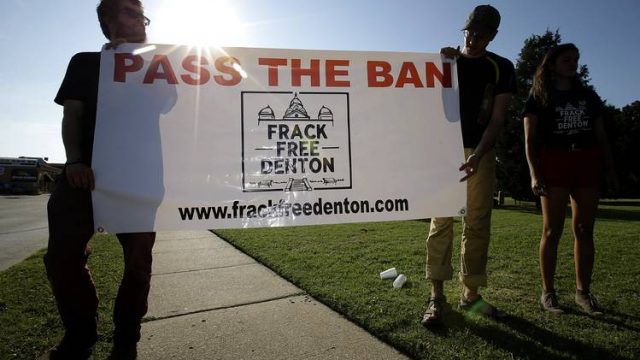Should State Government Trump Local Government When It Comes To Energy Regulation?

The State of Texas has just passed an exercise in meta law. Lawmakers there have created a ban on fracking bans.
“Republican Texas Gov. Greg Abbott has signed into law a prohibition on cities and towns imposing local ordinances preventing fracking and other potentially environmentally harmful oil and natural gas activities,” reports ABC News. “The much-watched measure sailed through the GOP-controlled Legislature after voters in Denton, a university town near Dallas, banned hydraulic fracturing locally in November.”
At Hot Air, Jazz Shaw says he isn’t sure how to feel about this development given the conservative preference for localism. “These are the entities which are most directly tied to the will of the voters and they deal with issues specific to the needs of the community,” he writes. “No matter how misguided, these are the choices that local voters make and they usually have to live and learn from them. How do we align fidelity to small government conservative principles with the idea of the state (or federal) government stepping in and overriding their choices?”
[mks_pullquote align=”right” width=”300″ size=”24″ bg_color=”#000000″ txt_color=”#ffffff”]Barring a need for broad statewide or national policy decisions should be left up to local governments. But when it comes to regulating energy development, there is a need for a broader sort of policy.[/mks_pullquote]
These are valid concerns to have, but as a fellow conservative who is also very much a supporter of fossil fuel energy development I would address them thusly: Barring a need for broad statewide or national policy decisions should be left up to local governments. But when it comes to regulating energy development, there is a need for a broader sort of policy.
It would be devastating for many of our industries – not just energy but things like agriculture and trucking – if we allowed every political subdivision to create its own set of regulations and laws. Can you imagine trying to develop resources on a map filled with dozens or even hundreds of different sets of byzantine bans and regulations?
This is why it often makes sense to enact laws at a higher level of government. For instance, the laws governing commercial drivers licenses are a matter of state and federal policy because commercial drivers typically operate in a number of different communities. It would be absurd to expect that driver to get licensed in each community, so instead he or she complies with regulations established by the state for all communities in that state.
The same is true of energy development. “But Rob,” you may be tempted to ask, “you very often spend your time complaining about the federal government overstepping into what should be state business? Isn’t this the same issue?”
My answer is that these are complicated matters and there is rarely a one-size-fits-all solution for all types of policies. For instance, I think it’s ridiculous that school lunch policy is set in Washington DC. That ought to be a state issue, and probably a local school district at best. Setting national energy policy, too, is problematic. Things like geology and climate vary from state to state and it makes more sense for each state to develop its own policies than for the federal government to create a one-size-fits-all policy.
But it doesn’t make sense for each little municipality or township or even county to develop its own energy policy. That’s a good way to make the cost energy development too prohibitive, to the detriment of the prosperity of our entire country.
The genius of the American system of government is that we have multiple layers of government to which different spheres of policy can be assigned. It’s very true that federal and even state governments tend to operate well outside those spheres, at least in the minds of conservatives, but I don’t think this ban on fracking bans in Texas is one of those situations.




